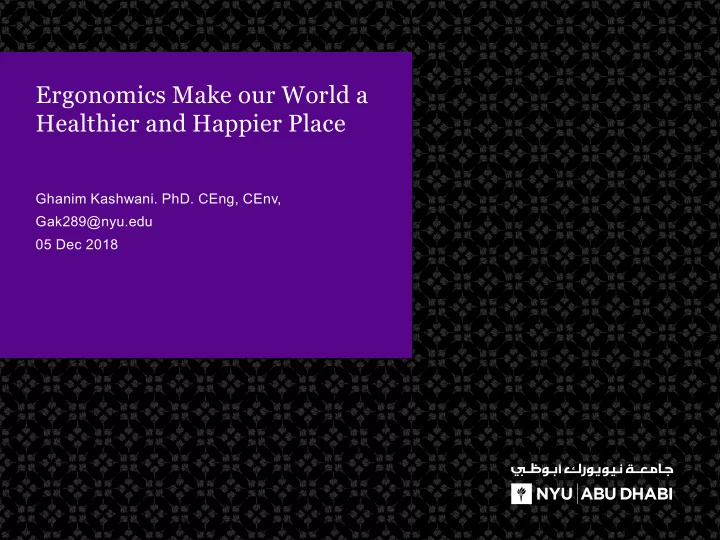

Ergonomics Make our World a Healthier and Happier Place Ghanim Kashwani. PhD. CEng, CEnv, Gak289@nyu.edu 05 Dec 2018
WHAT IS HUMAN FACTOR/ERGONOMIC (HFE)? • According to the International Ergonomics Association (IEA, 2000), ergonomics or human engineering is the scientific discipline concerned with the understanding of communications among humans and other elements of a system, and a business applies the theory, principles, and methods to the enterprise in order to optimise human well-being . 2
(HFE) ROLE 3
ERGONOMIC ROLE 4
ERGONOMIC ROLE • My perspective on involving ergonomics with the organizational system is that it boosts employee contribution by acknowledging that workers are more comfortable in their organization and that a better atmosphere can lead to better performance. • Thatcher and Yeow (2018) supports this claim in their study. They believe that when an employee has a better knowledge and understanding of the procedures, processes, and activities that are designed for his/her wellbeing, the level of productivity in the organization will increase. 5
ERGONOMIC ROLE • Azadeh et al. (2008), in their research work, emphasise that there is a lack of development plans to further train site workers, something that applies to other employees in the organisation, such as engineers, team leaders, and managers. • . According to Lozano (2011), most industrial organisations address corporate social responsibility (CSR) and corporate sustainability (CS) with a tit-for-tat strategy. From a behavioural ecology and socio-biology view, this strategy cannot be representative due to its short-term impact where indicators such CSR and CS take a long time to contribute to the economic growth. 6
ERGONOMIC AT WORKPLACE 7
ERGONOMIC AT WORKPLACE 8
ERGONOMIC AT WORKPLACE 9
ERGONOMIC AT WORKPLACE 10
ERGONOMIC AT WORKPLACE 11
12
13
14
THANK YOU 15
Recommend
More recommend